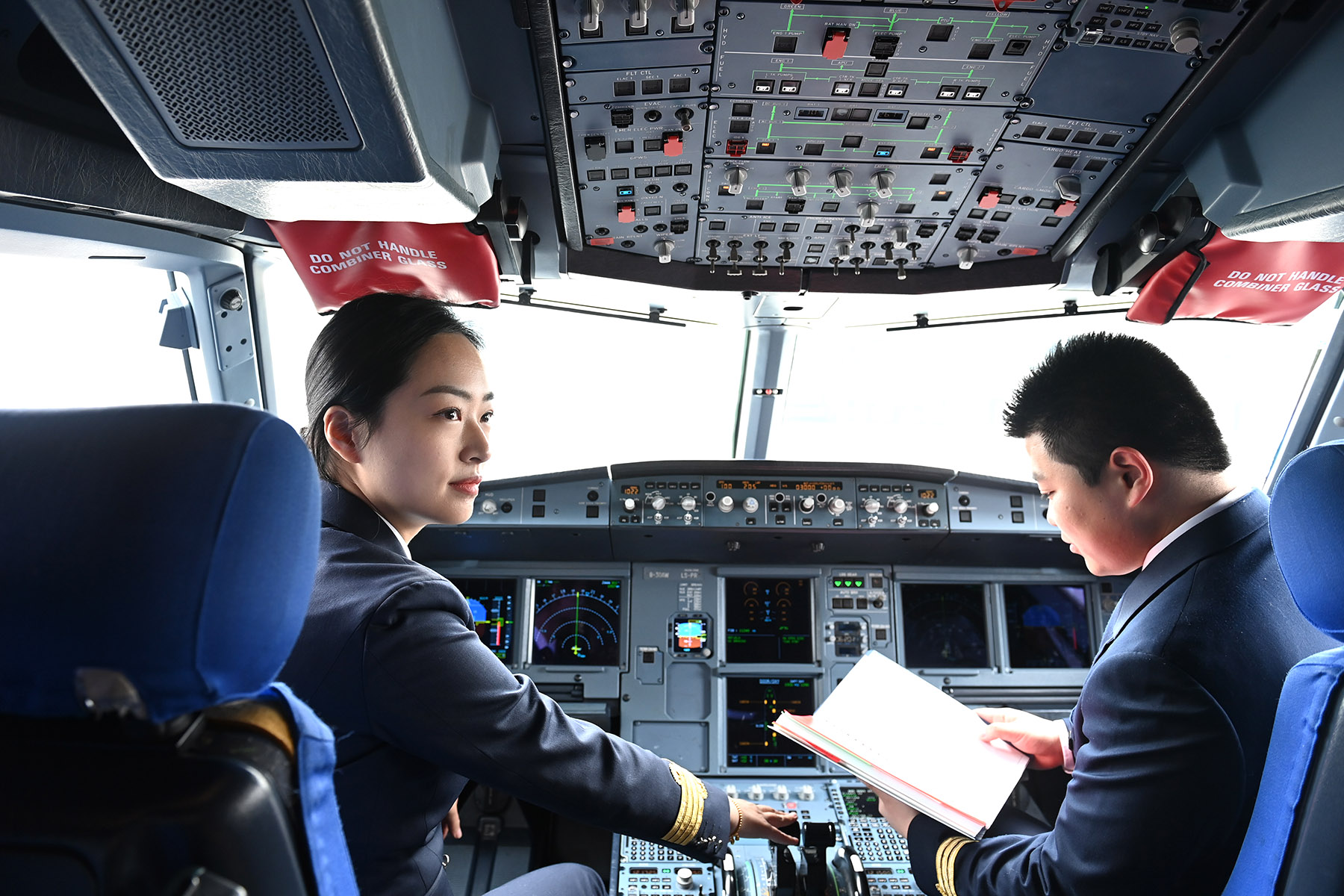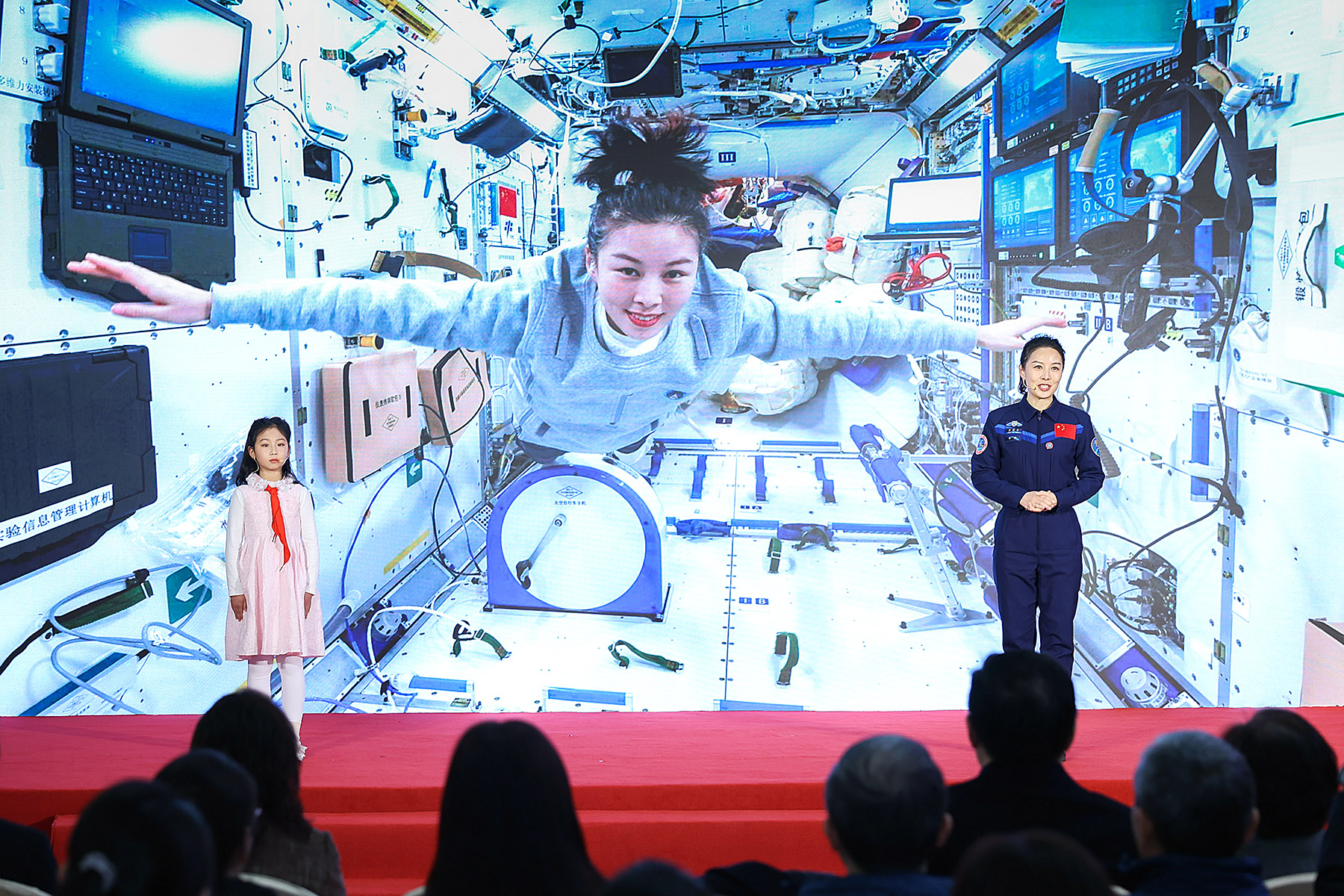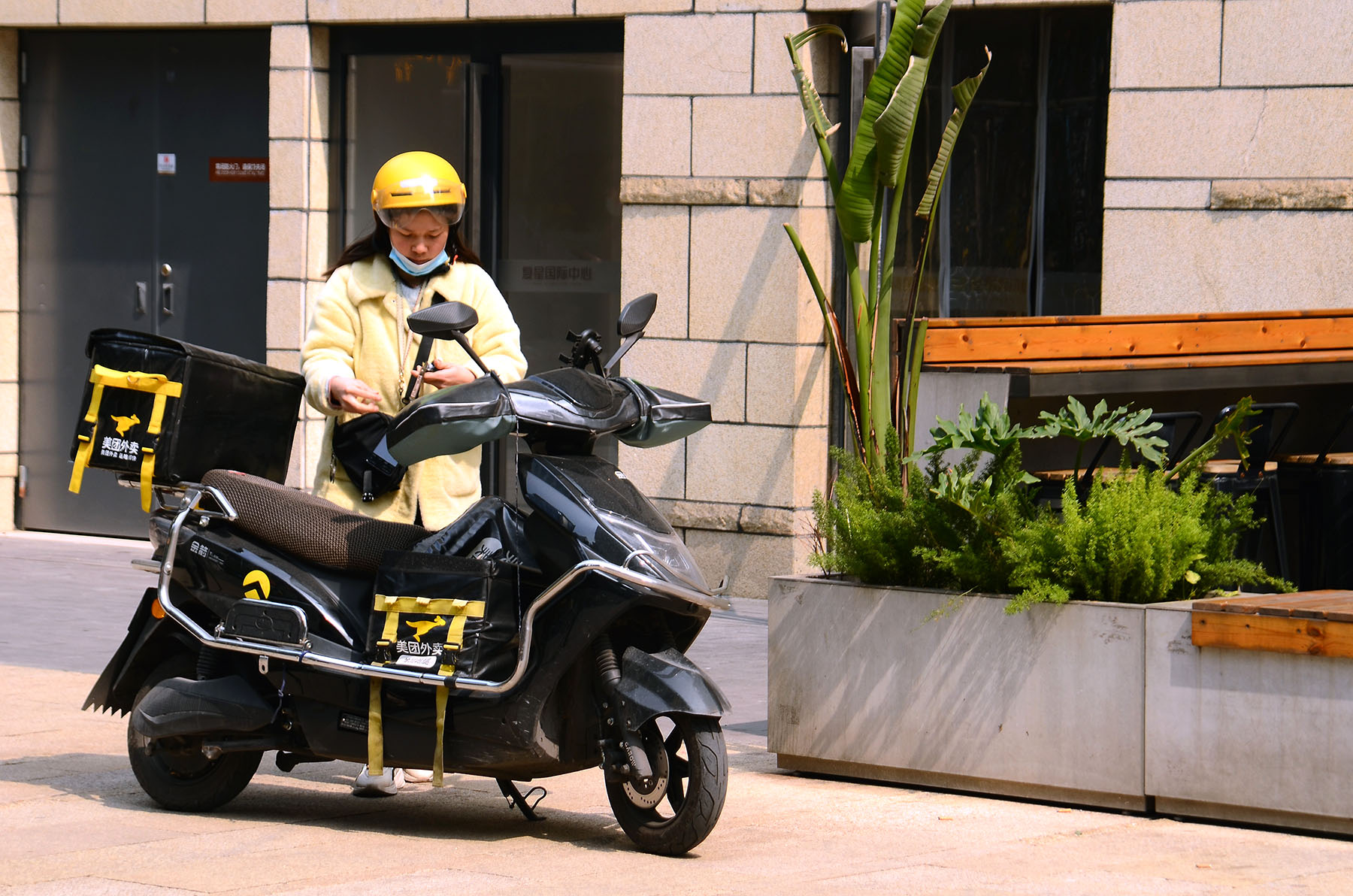Pioneering women redefine roles, realm of possibilities in male-dominated spaces as they challenge norms

For decades, Chinese women have been pushing against boundaries and gender stereotypes in traditionally male-dominated industries. From civil aviation and technology to food delivery, they have carved out their own unique niche with resilience and skill-building.
Their progress has redefined the realm of possibilities in male-centric spaces, while they continue to challenge outdated norms and broaden opportunities for gender equality across professional landscapes in China.
For instance, a growing number of women have pursued careers as pilots. Unlike in previous years when strict gender controls were imposed on pilot recruitment, an increasing number of domestic airlines have gradually lifted restrictions on hiring female pilots.
Just over a decade ago, Guangzhou-based China Southern Airlines had only five female pilots. Today, the number has grown to over 30. Through their own efforts and guided by the spirit that women are no less capable than men, these female pilots have reached new heights with professionalism and dedication.
While female pilots may not match their male counterparts in physical strength, industry insiders noted that many have increased their daily training to boost both their physical fitness and decision-making capabilities.
Gong Qian, one of China’s first batch of domestic, independently trained female pilots and a captain instructor for the wide-body Airbus A330, has been flying for more than 18 years.
She has diligently honed her flying skills and claimed second place in China Southern’s wide-body aircraft flying skills competition in 2022.
Beyond civil aviation, the People’s Liberation Army Air Force has been training an increasing number of female service members and pilots. Earlier this year, a group of nine female cadets specializing in flying transport aircraft underwent rigorous training in Xi’an, Northwest China’s Shaanxi province. With an average age of just 22, they are pushing the limits and piloting domestically produced military jets.
“From the moment I chose the blue sky, I was ready to face every challenge and looked forward to piloting the Y-20 strategic transport plane on international missions,” said Xin Ling, a female flight cadet.
This year marks the 30th anniversary of the 1995 Fourth World Conference on Women in Beijing. The country has consistently honored its commitments to advancing women’s development, such as promoting gender equality along with economic and social progress.
Over the past 30 years, China has made remarkable strides in poverty alleviation, healthcare, education, and other key areas concerning women’s well-being, reflecting the rapid progress of women’s development in the modern era.
Now, “full-time dads” — fathers who prioritize caregiving for children and managing household responsibilities — are no longer making headlines, and are an indication of how gender role stereotypes have loosened their hold in China.

As societal attitudes evolve and professional barriers gradually fade, a growing number of female executives have come to the fore, driving industry innovation with their distinctive leadership styles and professional expertise, and paving the way for future generations of women to pursue careers in many industries.
Wang Fang, chief financial officer of Embraer China, has worked for several multinational companies throughout her career and joined the China branch of Brazilian aircraft manufacturer Embraer SA as a credit specialist and financial analyst. She said success is primarily measured by performance and capability, with the emphasis placed on an individual’s contributions, not their gender.
“The challenges that I have focused on are common and professional ones like navigating complex financial regulations, managing risks, and ensuring robust financial health for the company, especially during critical times like the COVID-19 pandemic,” Wang said.
“From my experience, when an individual demonstrates competence, dedication, and a results-oriented mindset, they can earn respect and credibility, regardless of gender,” she added.
As a female leader, Wang holds the belief that effective leadership emerges from a blend of diverse qualities. Among these, traits traditionally linked to feminine strengths — such as empathy, attention to detail, and communication skills — prove valuable in the fields of finance and management.
Meanwhile, the proportion of female internet entrepreneurs has been rising over the years. Now, China has some 40 million female scientists and technicians, accounting for more than 45 percent of the total, demonstrating their outstanding innovative capabilities in the field of science and technology, according to data revealed at the 2024 Zhongguancun Forum Annual Conference.
Wang Lijuan, head of operations, performance, and digital at Airbus Beijing Engineering Center, has been driving the company’s digital transformation since 2023. Fueled by her passion for technology, she is dedicated to building smarter operational platforms that empower engineers and unlock their creative potential.
“Women in engineering still face certain stereotypes. But I have always believed that skills and curiosity transcend gender. Every challenge is a chance to grow — to learn new technologies, explore new fields, and keep expanding my horizons,” Wang said.

She said such a mindset is also reflected in her workplace. Wang believes Airbus has built an open, inclusive environment where everyone has an equal chance to succeed.
“From hiring to promotion, the company focuses on performance, ensuring every employee’s effort is fairly recognized and rewarded.” Such a culture empowers women to thrive in high-tech fields and helps diverse talent reach its full potential, she added.
Wang has also gained broad recognition across Airbus and the wider industry for her expertise and leadership. “The company has shown great trust in me, allowing me to take the lead on major digital transformation initiatives,” she said.
Her team’s innovations have also attracted government attention, with supportive policies and incentives encouraging companies to keep investing in new technologies. Wang believes such measures help boost digital transformation and open more doors for women in technology to shape innovation and make their mark.
Besides, more women are joining the ranks of emerging occupations — such as food delivery riders — that were once male-dominated. Amid the hustle of their daily rides, they are redefining their sense of self-worth and reshaping their social roles.
Data showed that from 2022 to 2024, the number of female riders in China increased from 517,000 to 701,000, growing 35.6 percent over the two-year period, with women currently making up a single-digit percent of its riders nationwide, according to on-demand delivery platform Meituan.
Over the same period, the total number of riders at Meituan grew from 6.24 million to 7.45 million, with the number of female riders growing at a faster rate than that of men.
Women hold more than 30 percent of the management roles at Meituan’s delivery stations, including roles such as station managers, deputy managers, and team leaders.
The company noted that while delivery work requires physical strength, it also requires communication, emotional management, and organizational skills. Women’s strengths in empathy, attention to detail, and collaboration are emerging as a key force driving service quality and professionalism across the sector.
Meantime, data from ride-hailing platform Didi showed a sharp rise in the number of female drivers in China, with more than 1.05 million in 2024, up 75 percent from the previous year.
A separate report by ride-hailing platform T3 Go, the 2025 Annual Employment Report on Female Drivers, found a similar trend. By February last year, the platform had more than 70,000 female drivers, up 14 percent over 10 months. Nearly 60 percent of them spent over eight hours a day on the road.
T3 Go’s report also shows that female drivers consistently earn higher five-star ratings than men. Passengers most often praise them for their friendly attitude, smooth driving, patience, clean vehicles, and calm demeanor.
Jobs such as food delivery riders and ride-hailing drivers constitute part of the gig economy — a new economic form that integrates the digital economy with flexible employment. This economic model has offered women abundant employment opportunities.
The growth of women in the gig economy signals more than just a shift in employment patterns — it reflects China’s broader transition toward a higher-quality service sector.
“The ‘gig economy’ is increasingly emerging as a key driver of the new forms of employment and a new growth engine for the broader economy,” said Yan Fei, an associate professor at Tsinghua University’s School of Social Sciences.
“The most prominent feature of the ‘gig economy’ is its reliance on internet technology. Its scope of work has expanded significantly, covering physical labor such as food delivery and courier services, creating employment opportunities for more workers,” Yan said.
Zhang Chenxu contributed to this story.
Contact the writers at zhuwenqian@chinadaily.com.cn


